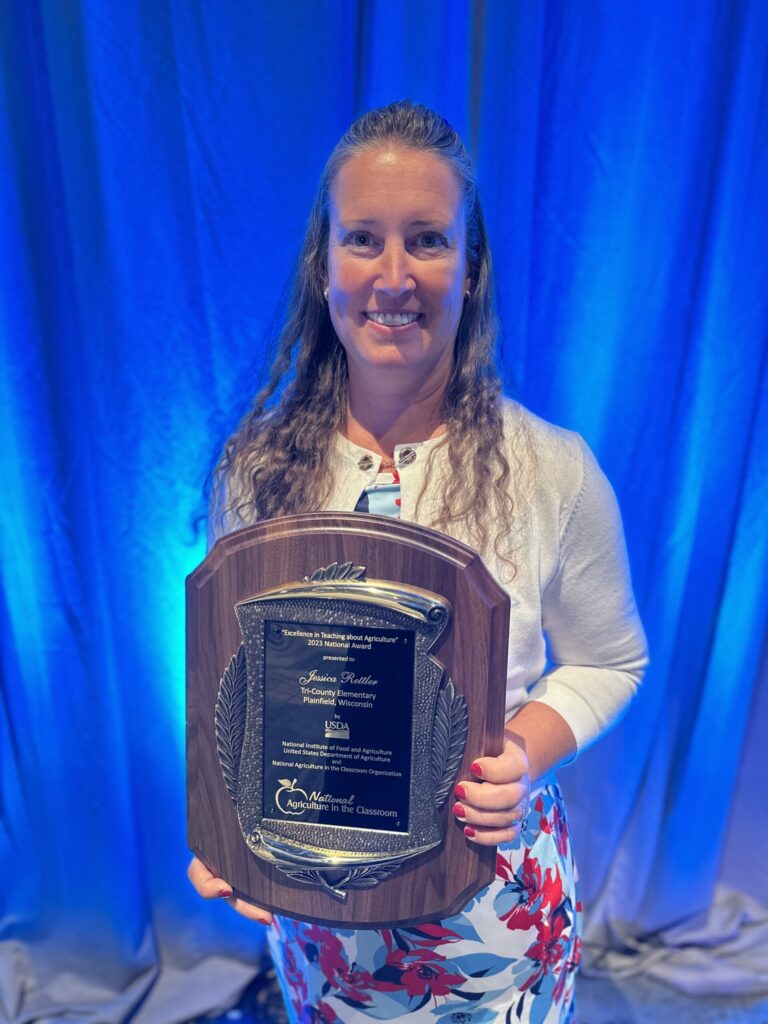
Jessica Rettler, a teacher from Tri- County Elementary, was recognized today as a 2023 National Excellence in Teaching About Agriculture Award recipient during the National Agriculture in the Classroom Conference. Rettler is one of seven teachers recognized during the conference, which is taking place June 26-29 in Orlando, Florida.
The National Agriculture in the Classroom Organization (NAITCO), U.S. Department of Agriculture’s National Institute of Food and Agriculture (USDA-NIFA) and Farm Credit partner each year to honor teachers in pre-kindergarten through 12th grade (Pre-K-12) from around the country for the innovative ways they use agricultural concepts to teach reading, writing, math, science, social studies, STEM, STEAM and more.
“These outstanding teachers recognize that agriculture also is a perfect foundation for teaching biology, chemistry, climatology, math, and literacy, in ways that any age or level of students can understand, value and apply to their daily life,” said Dr. Dionne Toombs, acting director of USDA-NIFA, which provides federal leadership and annual funding for NAITC. “When a student makes that real-life connection to the lessons and activities their teachers share, students continue to learn and value the true meaning of those lessons when they leave the classroom. Innovative teachers like these are often responsible for awakening a student’s love of learning, nature and science.”
Rettler has found a variety of ways to share the multifaceted world of agriculture with students, their families and peers. Through discussions of current agriculture-related topics, experiencing agriculture hands-on through making ice cream and fruit smoothies, sampling real maple syrup, and taking field trips to local farms, she truly brings agriculture to life for her students.
“National Agriculture in the Classroom is honored to recognize and celebrate these talented teachers for their innovative approach to teaching core academic concepts through the lens of food and agriculture,” said Katie Carpenter, president of NAIYTCO and director of New York Agriculture in the Classroom. “Their effort to provide authentic learning experiences for their students is critical to creating an agriculturally literate generation who understands and appreciates the source and value of agriculture in their daily lives.”
“Teachers are key partners in agricultural literacy education, helping to shape the next generation of agriculture advocates through intentional and engaging activities,” said president and CEO of the Farm Credit Council Todd Van Hoose. “Farm Credit is proud to honor these innovative educators and support their ongoing commitment to growing future leaders.”
In addition to Rettler, this year’s winning teachers also include:
Primary:
- Clayton and Megan Kappauf, a husband and wife who teach at Oxford Academy and Central School District-Primary School in Oxford, NY, have found creative ways to bring their passion for gardening, food production, and food processing into their classrooms. With the use of equipment such as grow towers, dehydrators, and aeroponic grow systems, students are exposed to a variety of different fresh vegetables, fruits, and herbs and their uses.
- Haley Broussard, a teacher at Dozier Elementary in Erath, LA, provides her students with unique real- world learning experiences that enable students to learn outside of the four walls of the classroom. The school’s garden has become an essential piece of her curriculum, as she uses it to help teach core concepts such as economics, food, health, technology, and engineering through experiential learning.
- Jessica Rettler, a teacher at Tri-County Elementary in Plainfield, WI,
- Melody Thieme, a teacher at Crimson View Elementary in St. George, UT, ensures all 4th-grade students are exposed to the many learning opportunities found in the school greenhouse. From learning to plant seeds or starter plants, to growing Utah native wildflower plants and later learning how to preserve them. She incorporates the use of math to create plant growth data charts, and comparative studies are done by growing the same plants in the aquaponics side of the greenhouse to the soil side bins.
- Monica Massei, a teacher at Kennedy Elementary School in Winder, GA, works with various organizations to bring together volunteers and resources to teach her students about agriculture. Her students learn core subject matter through the use of grow towers, goats, chickens, and making overnight pickles for a fundraiser. Massei finds creative ways to bring students, families, and the community together to learn where their food, fiber, and fuel comes from.
- Stacey Sanborn, a teacher at Manchester School in Windham, ME, believes the in the importance of access to fresh food for all. Her dedication to gardening and local food access has led to her students being able to help provide produce to the school cafeteria and local food pantry. Students are actively involved in all aspects of the garden, and year-round food activities are integrated into her curricula.
Secondary:
- Jennifer Hatch, a teacher at Benjamin Franklin Middle School in Rocky Mount, VA, has spent the majority of the last 25 years teaching mathematics. Her desire to create student awareness of agriculture and interest in math led to the inclusion of a hydroponics unit. The hydroponics project allowed her to present her students with a hands-on way to apply required math concepts while also integrating lessons about agriculture.
- Kendel Hayden, a teacher at Owensboro iMiddle in Owensboro, KY, found the implementation of a raised bed garden to be an ideal opportunity to fit the project-based learning school structure. As an Ancient World History teacher, she saw the real-life application of having her students grow fresh produce drawing a correlation to early farming. This project was then extended to share the harvest with the cafeteria and local shelter, beginning a composting program and building a hydroponic growing system.

You must be logged in to post a comment.